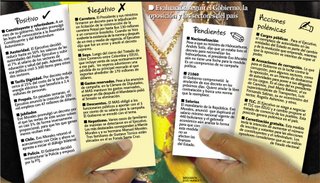Political parties and citizen groups registered yesterday for the Constituent Assembly (CA). There are
10 groups running towards this election at national level: MAS, Podemos, UN, MNR, MIR, UCS, MBL, CN, Muspa and Movimiento Ayra.
The first four fronts are the only ones that have parliamentary representation and run -with different levels of success- in the December elections.
A second group would be comprised of older political parties that, because internal problems and disintegration, did not run in December. These are Jaime Paz Zamora's MIR (Movimiento de Izquierda Revolucionaria), Fernandez's UCS (Union Civica Solidaridad), and MIR split cell MBL (Movimiento Bolivia Libre). As I understand,
MBL has colluded with MAS in Cochabamba, so that MAS can have the three constituents. Other old political party in the run, though not at national level, is Tuto Quiroga's former party, ADN. According to the
National Electoral Court, ADN is presenting candidates in all departments except Beni, Cochabamba, Pando and Santa Cruz. In those departments, ADN is running with different alliances.
The last group, comprised by CN (Concertacion Nacional), Muspa (Movimiento de Unidad Social Patriótica) and Moviemiento Ayra, we have the newbies and I have not been able to find much information on them.
Among those running for places in the CA, we have UN's founder Doria Medina, ex-president of the Senate Vaca Diez, as well asmilitariess, artists and periodists. Quiroga, Mesa and Rodriguez Veltze are not running with any front.
Since the registration,
MAS has suffered several complaints. CIDOB (the Confederation of Indigenous Peoples in Bolivia) has, for example, expressed their dissatisfaction because MAS did not take into account their candidates in all agreed electoral districts. The National Council of Ayllus and Marcas of the Qollasuyo, the Sindicated Federation of Peasant Workers of La Paz, the Santa Cruz Ethnic Peoples Coordinator and the Bolivian Confederation of Disabled Persons expressed similar complaints.
Update 1: According to
today's La Razon, there are 12, not 10, fronts running for the CA at national level. From these, 9 are political parties, 2 are citizen's groups and 1 is an alliance of different groups (Podemos). Moreover, there are also other 13 groups running only at regional level. The list of contenders, by departments is as follows (taken from La Razon):
LA PAZ
• Acción Democrática Nacionalista (ADN)
• Movimiento al Socialismo (MAS)
• Movimiento Bolivia Libre (MBL)
• Movimiento Nacionalista Revolucionario (MNR)
• Movimiento de Izquierda Revolucionaria (MIR)
• Unidad Cívica Solidaridad (UCS)
• Unidad Nacional (UN)
• Movimiento Ayra (Ayra)
• Movimiento de Unidad Social Patriótica (Muspa)
–Asociación Social Patriótica (ASP)
–Transformación Democrática y Patriótica (Tradepa)
–Concertación Nacional (CN)
* Poder Democrático y Social (Podemos)
SANTA CRUZ
• Movimiento al Socialismo (MAS)
• Unidad Nacional (UN)
• Movimiento Bolivia Libre (MBL)
• Movimiento Nacionalista Revolucionario (MNR)
• Movimiento de Izquierda Revolucionaria (MIR)
• Movimiento Ayra (Ayra)
• Movimiento de Unidad Social Patriótica (Muspa)
–Concertación Nacional (CN)
–Transformación Democrática y Patriótica (Tradepa)
–Autonomía Social Integradora (ASI)
–Autonomía Para Bolivia (APB)
–Movimiento de Acción Ciudadana (Maca)
* Poder Democrático y Social (Podemos)
* Alianza 3-MNR (A3-MNR)
* Alianza Andrés Ibáñez (ADN, MIR y UCS)
COCHABAMBA
• Movimiento al Socialismo (MAS)
• Unidad Nacional (UN)
• Movimiento Bolivia Libre (MBL)
• Movimiento de Izquierda Revolucionaria (MIR)
• Movimiento Nacionalista Revolucionario (MNR)
• Movimiento Ayra (Ayra)
• Movimiento de Unidad Social Patriótica (Muspa)
–Concertación Nacional (CN)
–Transformación Democrática y Patriótica (Tradepa)
–Convergencia Democrática Ciudadana (CDC)
* Poder Democrático y Social (Podemos)
POTOSÍ • Movimiento al Socialismo (MAS)
• Unidad Nacional (UN)
• Movimiento de Izquierda Revolucionaria (MIR)
• Movimiento Nacionalista Revolucionario (MNR)
• Movimiento Bolivia Libre (MBL)
• Acción Democrática Nacionalista (ADN)
• Movimiento Ayra (Ayra)
–Concertación Nacional (CN)
–Transformación Democrática y Patriótica (Tradepa)
–Movimiento Originario Popular (MOP)
–Alianza Social (AS)
* Poder Democrático y Social (Podemos)
CHUQUISACA • Movimiento al Socialismo (MAS)
• Unidad Nacional (UN)
• Acción Democrática Nacionalista (ADN)
• Movimiento de Izquierda Revolucionaria (MIR)
• Movimiento Nacionalista Revolucionario (MNR)
• Movimiento Bolivia Libre (MBL)
• Unidad Cívica Solidaridad (UCS)
• Movimiento de Unidad Social Patriótica (Muspa)
• Movimiento Ayra (Ayra)
–Concertación Nacional (CN)
–Transformación Democrática y Patriótica (Tradepa)
* Poder Democrático y Social (Podemos)
ORURO • Movimiento al Socialismo (MAS)
• Unidad Nacional (UN)
• Acción Democrática Nacionalista (ADN)
• Movimiento de Izquierda Revolucionaria (MIR)
• Movimiento Nacionalista Revolucionario (MNR)
• Unidad Cívica Solidaridad (UCS)
• Movimiento de Unidad Social Patriótica (MUSPA)
• Movimiento Ayra (Ayra)
–Concertación Nacional (CN)
–Transformación Democrática y Patriótica (Tradepa)
–Movimiento San Felipe de Austria (MSFA)
–Movimiento Autónomo Regional (MAR)
–Alianza de Bases (Alba)
–Movimiento de Integración Boliviana (Mibol)
* Poder Democrático y Social (Podemos)
TARIJA • Movimiento al Socialismo (MAS)
• Unidad Nacional (UN)
• Acción Democrática Nacionalista (ADN)
• Movimiento de Izquierda Revolucionaria (MIR)
• Movimiento Bolivia Libre (MBL)
• Movimiento Nacionalista Revolucionario (MNR)
• Movimiento de Unidad Social Patriótica (Muspa)
• Movimiento Ayra (Ayra)
–Concertación Nacional (CN)
–Transformación Democrática y Patriótica (Tradepa)
* Poder Democrático y Social (Podemos)
BENI • Movimiento al Socialismo (MAS)
• Unidad Nacional (UN)
• Movimiento de Izquierda Revolucionaria (MIR)
• Movimiento Nacionalista Revolucionario (MNR)
• Movimiento Ayra (Ayra)
• Movimiento de Unidad Social Patriótica (Muspa)
–Concertación Nacional (CN)
–Transformación Democrática y Patriótica (Tradepa)
* Poder Democrático y Social (Podemos-ADN)
PANDO • Movimiento al Socialismo (MAS)
• Unidad Nacional (UN)
• Movimiento de Izquierda Revolucionaria (MIR)
• Movimiento Nacionalista Revolucionario (MNR)
• Movimiento Ayra (Ayra)
• Movimiento de Unidad Social Patriótica (Muspa)
–Transformación Democrática y Patriótica (Tradepa)
* Poder Democrático y Social (Podemos-ADN)
• PARTIDO POLÍTICO
– AGRUPACIÓN CIUDADANA
* ALIANZA
Bolivia,
Bolivien,
Evo,
Evo Morales,
Constituent Assembly
















